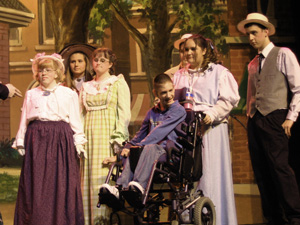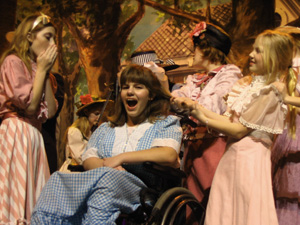“We’re all in this together.”
“We make each other strong.”
“We are different in a good way.”
With phrases like these, the mentors and artists of the Penguin Project are encouraged to overcome the differences they have with one another. The Penguin Project is designed to be a fun learning experience in the theater world for children with disabilities. The artists—children with disabilities—are paired with mentors— children without disabilities—of their own age. “We try to pair up children who go to school with each other. They ultimately become friends,” states Dr. Andy Morgan, director and founder of the Penguin Project.
The Penguin Project was named after the animal that was born handicapped. “Penguins are disabled birds and are unable to fly, and yet, they are able to negotiate their environment through other means and are very successful,” Dr. Morgan explains. He states that children with disabilities can relate to penguins. The Project’s slogan says it best: Our penguins may not be able to fly, but that does not prevent their spirits from soaring.
Dr. Morgan, or “Dr. Andy” to the children, is a developmental pediatrician and the chief of child development at the University of Illinois College of Medicine at Peoria. He is the primary specialist for children with disabilities in central Illinois, with a focus on cerebral palsy. Although this is his specialty, he also sees children with mental retardation, autism and ADHD, among other conditions.
Dr. Morgan and his wife, Kathy, who is the assistant director and choreographer for the Penguin Project, have both been involved in theater for years. Kathy, a trained classical ballerina, turned to theater after meeting her husband. She helped him direct several musicals around the Peoria area and also performed onstage with him. Dr. Morgan says that after being involved in community theater for most of his teenage and adult life, it “seemed natural to bring the two together,” with regard to his professional and personal interests.
“Theater provides a lot of benefits in terms of communication skills, socialization, self esteem and self confidence, and I figured this is a very good venue for children with disabilities. It would not only provide them with an opportunity to engage in an activity that they really don’t have the opportunity to engage in, but would also have therapeutic value,” he said.
 The artists involved with the program have disabilities ranging from physical handicaps to neurological disorders. While disabilities such as Down syndrome, cerebral palsy, autism, mental retardation, learning disabilities, visual impairment, hearing impairment, and other physical disabilities may render it difficult for a child to sing or dance, Dr. Morgan and mentors encourage artists to perform to the best of their abilities. Peer mentors help each artist remember his/her lines or turn a wheelchair in time to the music, but, most importantly, they become true friends.
The artists involved with the program have disabilities ranging from physical handicaps to neurological disorders. While disabilities such as Down syndrome, cerebral palsy, autism, mental retardation, learning disabilities, visual impairment, hearing impairment, and other physical disabilities may render it difficult for a child to sing or dance, Dr. Morgan and mentors encourage artists to perform to the best of their abilities. Peer mentors help each artist remember his/her lines or turn a wheelchair in time to the music, but, most importantly, they become true friends.
The Penguin Project is geared toward artists who are eight to 21 years old. This year, there are 42 artists involved in the program. Dr. Morgan marvels, “Every year we have more mentors volunteer than artists; we have to turn them away. This is an incredible thing! The mentors give up their time each week. This is a big-time commitment to just know you are there to help, not to be onstage and be the star. Their compensation is the joy they get from being part of the process and program.”
In past years, mentors have always accompanied artists onstage while they perform. This year, Dr. Morgan and his staff are taking a different approach, encouraging artists to go onstage while their mentors cheer them on from backstage. While this is not possible for all artists, Dr. Morgan knows that, for some of the children, performing by themselves will be a great boost in confidence.
High School Musical was chosen for this year’s production for a number of reasons. “This is a kid favorite—every kid in the world these days loves High School Musical. It has gained incredible popularity, and it has within it some of the key features that we think are critical to a good production for the Penguin Project. There are lots of leads and chorus numbers, so there’s a lot of opportunity for the kids to do lots of things,” explains Dr. Morgan. “It’s the first one we’ve done that’s not a big-time, old-fashioned musical, but it does fit the bill in terms of having a CD and having lots of opportunities for the kids, and it has the extra added attraction of being a show the kids really know.
 “In a sense, we have taken away some of the unfair competition by making them compete with each other and not with their able-bodied peers. But through the mentor process, it also gives them a chance to engage in a community activity alongside their peers, and these opportunities are few and far between. It is also a chance for parents to see what their children can do, not what they cannot do—a time to see their kids shine.”
“In a sense, we have taken away some of the unfair competition by making them compete with each other and not with their able-bodied peers. But through the mentor process, it also gives them a chance to engage in a community activity alongside their peers, and these opportunities are few and far between. It is also a chance for parents to see what their children can do, not what they cannot do—a time to see their kids shine.”
And these parents are very supportive of the Penguin Project. Dr. Morgan estimates that around 30 to 40 parents attend each practice. “Every couple of practices we have the parents come out and do the dance that the kids have been practicing. The kids love that.”
The Penguin Project has been recognized in the community in several different ways. The program received the Paul Harris award for community service given by the Rotary Foundation of Rotary International in March 2006. In April 2007, it won the Lou Lowenkron Award for “the most innovative program for individuals with disabilities in the country.” This was given by the national Easter Seals organization, which annually underwrites one of the performances as a “gala” event for its staff and volunteers. In July of last year, the CHOICES Program honored Dr. Morgan with an award for community outreach. The Penguin Project was also recognized by the Kiwanis, who have adopted the program as their project for the year.
With the local success of the program, Dr. Morgan and his team are working to make the Penguin Project a reality throughout the United States. The first goal is to set up another project in Illinois before expanding nationwide. By establishing the project as a foundation and obtaining grants and funds, Dr. Morgan hopes to be able to start a new project in Illinois in the next few years. He explains that the Penguin Project Foundation would “send a group of people to create an infrastructure at the new site…using our creative materials like scripts and songs, and would spend about five weeks onsite, so that by the end of three months, they would be able to continue without our help.”
Dr. Morgan considers the Penguin Project “the best thing I have ever done. I’ve never experienced anything like this in terms of personal satisfaction and the joy of seeing what children can do. At the end of a long day, I get to rehearsal exhausted, but within five minutes of being there, I am energized by the kids. It is so much fun being there and seeing what they can do.” TPW


